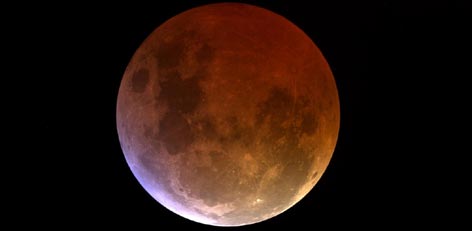
Total Eclipse of Moon to take place on January 31
Posted on: 25/Jan/2018 12:15:02 PM

A total eclipse of the moon will occur on January 31, 2018. This is the first eclipse of the year, with a rare coincidence of a blue moon and a super full moon. The full moon on that day happens to be the second full moon of the calendar month of January, termed as a blue moon. Further, the moon will be at perigee on January 30, as such the full moon will occur when the moon is near the closest to earth in its orbit. Hence, this full moon will be a little bigger and brighter than the regular full moon, popularly referred to as a super moon.
During totality, the moon will completely enter the earth�s umbral shadow and may look reddish. The sunlight, comprising of seven colours, fall on the earth�s atmosphere. The blue, violet and green portion of it are scattered most and are filtered out, the red and orange portion of it are scattered less, get bent by refraction in the earth�s atmosphere, fall on the moon�s surface during totality making it reddish in colour to look from the earth.
The eclipse will begin as a partial eclipse from h. 17-18 IST and will continue up to h. 20-42 IST. The total eclipse will start from h. 18-21 IST and will end at h. 19-38 IST. The duration of the eclipse will be 3 h 24 mts and the duration of totality will be 1 hr 17 mts. The ending of the total and partial phases of the eclipse will be visible from all places of India. However the entire eclipse, from beginning to end of the partial and total phases, will be visible only from north eastern part of the country including Kolkata. The beginning of the partial phase will not be visible from the rest part of the country, as the partial eclipse will start before the moonrise timings of the most of the places of India. Similarly, the beginning of the totality phases of the eclipse will not be visible from the places along the extreme western coast of the country including Mumbai.
The eclipse will be visible in the region covering North America except the eastern part, western South America, Asia including India, Australia, the Middle East, northern Scandinavia, eastern Europe and eastern Africa.
The next eclipse of the Moon will occur on July 27-28, 2018, which will be a total lunar eclipse and will be visible in India.







